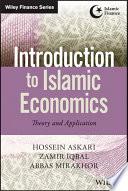
New Issues in Islamic Finance and Economics
Progress and Challenges
New Issues in Islamic Finance & Economics: Progress and Challenges provides a review of the main issues and challenges facing Islamic finance. The application of Islamic finance is currently limited to banking. This book starts with an overview of the factors and motives behind the development of Islamic finance. A critical review of issues facing the industry is provided followed by a detailed analysis of areas where further attention is required. The book offers some original thinking on issues pertaining to governance, institutions, public finance and economic development within an Islamic financial system.
- ISBN 13 : 1118179641
- ISBN 10 : 9781118179642
- Judul : New Issues in Islamic Finance and Economics
- Sub Judul : Progress and Challenges
- Pengarang : Hossein Askari, Zamir Iqbal, Abbas Mirakhor, Zamir Iqbal, Abbas Mirakhor, Zamir Iqbal, Abbas Mirakhor, Zamir Iqbal, Abbas Mirakhor, Zamir Iqbal, Abbas Mirakhor, Zamir Iqbal, Abbas Mirakhor, Zamir Iqbal, Abbas Mirakhor, Zamir Iqbal, Abbas Mirakhor,
- Kategori : Business & Economics
- Penerbit : John Wiley & Sons
- Bahasa : en
- Tahun : 2011
- Halaman : 310
- Google Book : http://books.google.co.id/books?id=Zt6Gc-yImgEC&dq=intitle:Islamic+Monetary+Economics&hl=&source=gbs_api
-
Ketersediaan :
The book offers some original thinking on issues pertaining to governance, institutions, public finance and economic development within an Islamic financial system. This volume certainly fills a gap in the Islamic finance literature.




